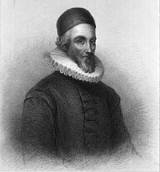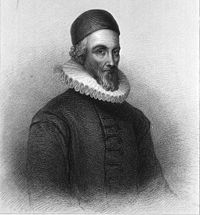
Andrew Cant
Encyclopedia

Edinburgh
Edinburgh is the capital city of Scotland, the second largest city in Scotland, and the eighth most populous in the United Kingdom. The City of Edinburgh Council governs one of Scotland's 32 local government council areas. The council area includes urban Edinburgh and a rural area...
called him to be their minister, but he was rejected by James I
James I of England
James VI and I was King of Scots as James VI from 24 July 1567 and King of England and Ireland as James I from the union of the English and Scottish crowns on 24 March 1603...
. Ten years later he was minister of Pitsligo in Aberdeenshire
Aberdeenshire
Aberdeenshire is one of the 32 unitary council areas in Scotland and a lieutenancy area.The present day Aberdeenshire council area does not include the City of Aberdeen, now a separate council area, from which its name derives. Together, the modern council area and the city formed historic...
, a charge which he left in 1638 for that of Newbattle
Newbattle
Newbattle is a village in Midlothian, in the ancient Roman Catholic Diocese of St. Andrews, about seven miles from Edinburgh. There was an abbey there founded about 1140, being the second of the six Cistercian Monasteries established by King David I of Scotland.-Newbattle Abbey:Newbattle Abbey was...
in Midlothian
Midlothian
Midlothian is one of the 32 council areas of Scotland, and a lieutenancy area. It borders the Scottish Borders, East Lothian and the City of Edinburgh council areas....
. In July of that year he went with other commissioners to Aberdeen
Aberdeen
Aberdeen is Scotland's third most populous city, one of Scotland's 32 local government council areas and the United Kingdom's 25th most populous city, with an official population estimate of ....
in the vain attempt to induce the university and the presbytery of that city to subscribe the National Covenant, and in the following November sat in the general assembly at Glasgow
Glasgow
Glasgow is the largest city in Scotland and third most populous in the United Kingdom. The city is situated on the River Clyde in the country's west central lowlands...
which abolished episcopacy in Scotland. In 1640 he was chaplain to the Scottish army and then settled as minister at Aberdeen. Though a stanch Covenanter, he was a zealous Royalist
Cavalier
Cavalier was the name used by Parliamentarians for a Royalist supporter of King Charles I and son Charles II during the English Civil War, the Interregnum, and the Restoration...
, preaching before Charles I
Charles I of England
Charles I was King of England, King of Scotland, and King of Ireland from 27 March 1625 until his execution in 1649. Charles engaged in a struggle for power with the Parliament of England, attempting to obtain royal revenue whilst Parliament sought to curb his Royal prerogative which Charles...
in Edinburgh, and stoutly advocating the restoration of the monarchy in the time of the Commonwealth
Commonwealth of England
The Commonwealth of England was the republic which ruled first England, and then Ireland and Scotland from 1649 to 1660. Between 1653–1659 it was known as the Commonwealth of England, Scotland and Ireland...
. Cant's frequent and bitter attacks on various members of his congregation led in 1660 to complaints laid before the magistrates, in consequence of which he resigned his charge. His son Andrew
Andrew Cant (educator)
Andrew Cant was a Scottish clergyman and scholar, and Principal of the University of Edinburgh from 1675 to 1685.He is believed to be the son of the Presbyterian minister and covenanter Andrew Cant ....
was principal of Edinburgh University (1675 - 1685).

